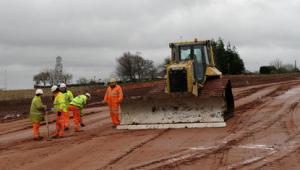29 May 2009
By Tash Shifrin
Proposals to set up a councils’ mutual fund that could be used to invest in capital projects are set to be presented at the Local Government Association conference in June.
The fund could attract investment from local government pension funds and some of the reserve money now placed on deposit with banks, according to Kent County Council Cabinet member for finance Nick Chard.
The proposal comes as local authorities seek to make better use of public money to support capital projects and regeneration during the credit crunch. The ideas include the Tax Increment Finance system under discussion in city councils such as Newcastle, Manchester and Birmingham.
Chard, who has been involved in discussions with the New Local Government Network and the LGA about models for a mutual fund, believes the system would work best on a regional basis.
He told Public Finance he had also been in talks with Essex and East Sussex councils about the proposals.
Chard said chunks of local government pension funds could be paid into a regional mutual, which could then invest in Private Finance Initiative projects, possibly during the lower-risk post-construction phase. This could help shore up the PFI at a time when private finance is hard to raise.
‘It would make public funds work harder for the residents,’ Chard said. ‘With the banks having problems with credit, it has come to the fore.’ Around 10% of pension funds would be ‘a reasonable amount’ to invest in the mutual, he suggested.
The mutual could also attract council deposits, although Chard emphasised that much of this cash was placed on a short-term basis. ‘People would want certainty they could get their money out. I don’t think it’s the right vehicle for most of the deposits,’ he said.
Proposals to be raised at the LGA conference would not be final, Chard said. ‘There will need to be quite a debate and then [we will need] to gauge the appetite’ for such a fund.
NGLN director Chris Leslie said pension funds offered a ‘neater fit’ for investment in capital projects over a longer term than deposits, but added: ‘The issue is to what extent you could meld those two together. That’s where the discussions have been.
‘You don’t want to mix up the management of local authority funds with the management of retired staff funds – those are quite different holdings.’ There had been ‘a lot of interest’ in the idea from local government superannuation funds, he added.
Meanwhile, Newcastle City Council has a site ready to pilot a regeneration scheme funded by Tax Increment Finance, subject to getting the green light from the government.
City treasurer Paul Woods told PF the aim was to fund the utilities and transport infrastructure for a proposed ‘Science City’ development with £35m to £40m of prudential borrowing. Under Tif, this would be paid back ‘using the extra [business] tax that would be generated’ by companies moving in to the area.
The November Pre-Budget Report is set to say whether it will give Tif pilots the go-ahead. But if the Newcastle scheme is approved, Woods said the council and ministers would ‘then negotiate what percentage we can have of the additional tax income and for how long’.




















